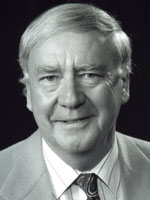
Alan H. Cowley
University of Texas at Austin
A Time of Change
I was introduced to the Gordon Research Conferences in the mid-1960s when I attended an Inorganic Chemistry GRC, a career-influencing event in every respect. I had never attended a meeting with such lively, abundant discussion. Moreover, the informal ambience encouraged both new friendships and meaningful interactions with several distinguished inorganic chemists whose work I had read and admired. I became an aficionado of GRC, and with Alex Cruickshank’s encouragement, I got in-volved with the organization’s management. I was elected to the GRC council for 1984 through 1987 and to the Selection and Scheduling Committee for 1988 to 1989.
Serving on the GRC board of trustees from 1989 until 1998 was a particular privilege and pleasure for me. The organization underwent significant change during this period. I served on the board for nine years–a record I share with Jim Florini. In fact, my tenure comprised two consecutive terms–an anomaly that arose because the limit on board terms changed from three to six years during my first term. This change was prompted by the realization that because GRC had grown significantly in size and complexity, three years was not enough time to “learn the ropes.” An elaborate changeover system was devised, largely by Tony Trozzolo, to account for board terms that had started in different years, and Jim Florini and I had the option to run for subsequent six-year terms. Alex Cruickshank’s retirement and Carl Storm’s subsequent appointment as the new director in 1993 were other significant changes during this time. I am indebted to both of these gentlemen for their abundant advice and warm friendship.
A major theme that evolved during my tenure as a trustee was internationalization. Even though conferees from outside the United States constituted more than 20 percent, in the early 1980s the board debated whether the organization regarded itself as a U.S.-only institution or whether it was more international in scope and philosophy. Beginning in the late 1980s, under the leadership of Bob Grasselli and John Fackler, the latter view prevailed, with its implementation being a concern of the board of trustees in the early 1990s. Efforts to internationalize took a number of forms, including visiting many prospective overseas conference sites with Carl Storm and dealing with various diplomatic issues. I have particularly vivid memories of a conference in Irsee, Germany, at which the board met with distinguished scientific representatives from Sweden and the then-member states of the European Union. Our main objective was to avoid any misunderstandings and to set forth reasons for holding Gordon Conferences in Europe. Although the meeting got off to a wobbly start, it finished amicably, and a cooperative arrangement was forged with the then-fledgling European Research Conferences.
During my first board term many had concerns about the diminishing number of potential scientists in the United States. The board agreed that GRC could and should play a role in helping to reverse this trend. In this context, and mindful of Neil Gordon’s contributions to science education (as the founding editor of the
Journal of Chemical Education, for example), the idea of holding a Science Education Gordon Conference emerged. My
colleagues thought I should organize the first such conference. Being a hard-core research type, I was somewhat daunted by this prospect but fortunately was inspired by a
Newsweek article featuring the late Paul Saltman, a distinguished educator and teacher. Together Saltman and I assembled a lively mixture of distinguished speakers and discussion leaders who represented the research and teaching communities. Much vigorous discussion took place, with the total attendance exceeding 160. Today science education remains an integral part of the GRC portfolio.